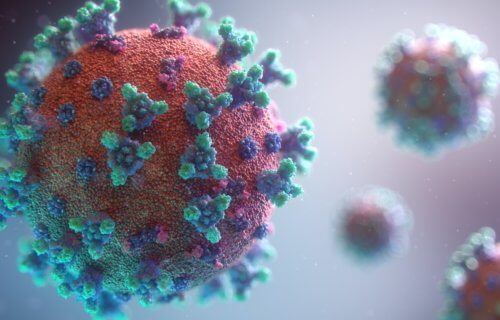SEATTLE, Wash. — COVID-19 antibodies may be able to stop the Omicron variant by targeting the few spots that the virus has in common with older coronavirus strains. A new study reveals that Omicron has a stunning 37 mutations in its spike protein, but antibody treatments still have a chance to beat it by targeting areas in SARS-CoV-2 that never change.
A team from the University of Washington School of Medicine say identifying the targets of “broadly neutralizing” antibodies will help scientists create a new wave of vaccines and treatments which work against Omicron and all other variants circulating during the pandemic.
“This finding tells us that by focusing on antibodies that target these highly conserved sites on the spike protein, there is a way to overcome the virus’ continual evolution,” says associate professor of biochemistry David Veesler in a university release.
COVID’s most unusual variant
Mutations in the spike protein of COVID virus cells lead to more and more variants spreading through the public. The spike plays a critical role, attaching to the surface of human cells and hijacking their functions to make more of the virus.
Antibodies from the immune system and vaccines recognize these spikes and attack them, blocking the virus from infecting people. However, when there are mutations in these spikes, antibodies can’t recognize them as easily and start to let the virus through. In the case of Omicron, scientists find this variant has 37 mutations, an unusually high number.
Researchers believe this is why Omicron is spreading so fast and why vaccinations are proving less effective at preventing new infections.
“The main questions we were trying to answer were: how has this constellation of mutations in the spike protein of the omicron variant affected its ability to bind to cells and to evade the immune system’s antibody responses,” Veesler explains.
The study author adds that his team believes Omicron may have developed all these mutations through the prolonged infection of a COVID patient with a weakened immune system. It’s also possible an earlier COVID strain jumped to an animal species, mutated, and then jumped back to people as Omicron.
Boosters are ‘really helpful’ against Omicron
The team examined how COVID antibodies interact with these mutations in a lab-created version of the Omicron variants. This “pseudovirus” is a genetically engineered, disabled, and non-replicating version of the virus which still produces the spike proteins on its surface like COVID.
Researchers noted similar results as other recent studies involving Omicron, finding that the new variant is 2.4 times better at binding to human cells than the original COVID strain.
“That’s not a huge increase,” Veesler says, “but in the SARS outbreak in 2002-2003, mutations in the spike protein that increased affinity were associated with higher transmissibility and infectivity.”
The team also discovered that Omicron can effectively bind to mouse cells, meaning it’s possible for the variant to “ping-pong” between humans and animals. As for the antibodies which target COVID, the study finds coronavirus vaccines are less effective against Omicron.
Specifically, people receiving a single dose of Johnson & Johnson vaccine have little-to-no ability to block the Omicron variants. Antibodies coming from the Moderna, Pfizer, and AstraZeneca vaccines are still able to neutralize Omicron, but their effectiveness drops off by 20 to 40-fold in comparison to other variants.
On a positive note, results show antibodies in people recovering from COVID and then getting the vaccine show even better protection against Omicron, seeing their effectiveness drop by only five-fold. Even better, people receiving a COVID booster see their protection drop only four-fold.
“This shows that a third dose is really, really helpful against omicron,” Veesler reports.
So, which antibodies can beat Omicron?
The team discovered four classes of antibodies that were able to stop earlier COVID variants and also neutralize Omicron. These virus fighters target one of four specific areas in the spike protein that seem to remain the same across all variants. Scientists add these areas are also present in other coronaviruses, called sarbecoviruses.
The team suspects that the unchanged areas likely remain unmutated because they play a key role in the virus’s function. Scientists call these “conserved” areas.
The new study points to the possibility that scientists can develop a new vaccine and antibody therapies which specifically target the conserved areas. This would ease the threat of defending against various mutations that continue to pop up.
The study’s findings appear in the journal Nature.
